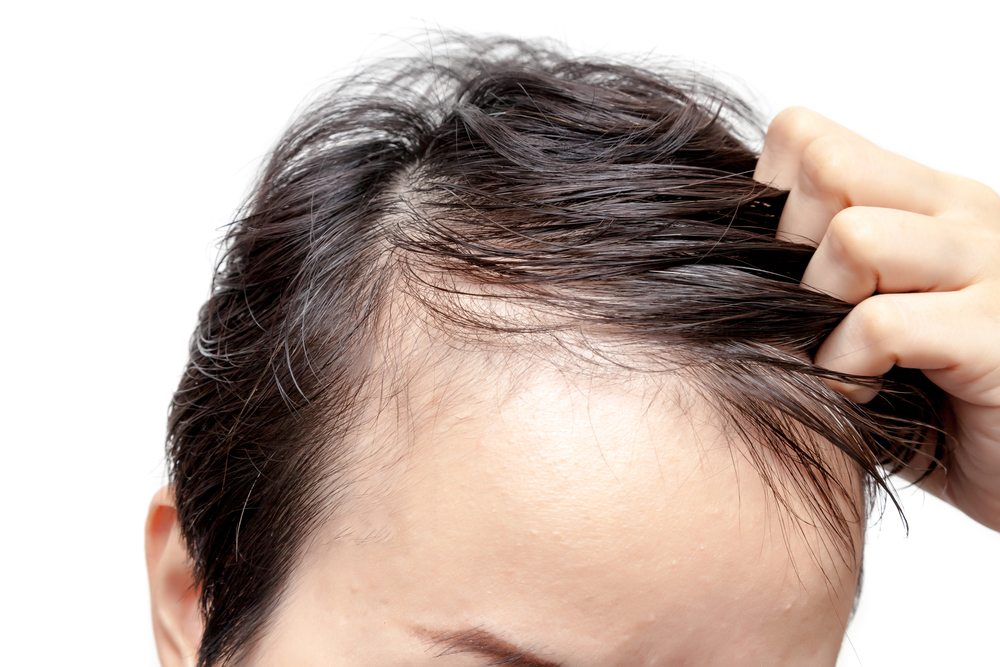
It is no secret that a common symptom of COVID-19 is hair loss. Many people who had the infection in the past are noticing hair thinning and increased hair loss on their scalp.
It is thought that the hair loss is not caused by COVID-19 itself, but rather the physiological and emotional stress that the virus puts on the body long term. Even for people who haven’t had the virus, the stressors of the last year can definitely have an effect on your hair cycle and hair growth patterns.
Common Causes of Hair Loss
1. Stress
It is normal to lose 50-100 strands of hair daily. When stress is a factor, however, our hair cycle shifts to a shedding phase where people will start to lose up to 3 times as much. While this cycle is typically temporary, it can be traumatic to individuals experiencing it.
2. Thyroid Imbalances
The thyroid is a gland in the neck that is responsible for your body’s metabolism and energy–but did you know that it also has an effect on hair growth?
Individuals who have thyroid hormone imbalances often notice increased hair loss and thinning on their scalp and/or eyebrows. This can occur when your body makes too much thyroid hormone (hyperthyroidism) AND too little thyroid hormone (hypothyroidism).
When having bloodwork ran, it is important that your doctor looks at all of your thyroid hormones. In the past, it was not uncommon for providers to only run a TSH (thyroid stimulating hormone), however, getting more comprehensive thyroid labs, including T3 and T4, is important for properly diagnosing thyroid disorders.
3. Nutritional Deficiencies
Nutritional deficiencies are very common and may be contributing to hair loss. Poor diet, impaired gut integrity and absorption problems can all contribute to nutritional deficiencies. Some common nutrient deficiencies that can contribute to hair loss include Vitamin D, Zinc, Biotin, Iron, Vitamin E and Vitamin C.
Working with a doctor to help discover if your body is depleted of certain nutrients and why can help improve your overall health—and help you get back your full head of hair.
4. Hormonal Imbalances
Hormonal imbalances can have a big effect on hair loss and thinning, especially if your body is metabolizing hormones improperly.
Testosterone is a hormone that is necessary for energy and libido in both men AND women. While testosterone is needed to make sure you feel your best if it is not metabolized to the proper form it can contribute to increased hair loss. An activated form of testosterone called dihydrotestosterone (DHT) is often responsible for male patterned baldness.
Your provider will look at your hormone labs and assess your symptoms to see if this may be a reason you are experiencing hair loss. There are many supplements and medications that can reduce the production of DHT and keep your hormones on the healthiest metabolic pathways possible.
Before and after pictures 0-12 weeks

While finding the root cause is always our goal, there are options available to help hair grow while we treat the causes listed above.
Some of Our Favorite Hair Growth “Remedies” Include:
1. Collagen powder
Collagen helps to promote hair growth by providing the amino acids necessary to build hair proteins and strengthen the hair root. It also has the added benefits of improved skin elasticity, strengthened nails, and joint protection.
2. Peptides
It is a common joke in our office to say, “there’s a peptide for that”, and this holds true for hair growth as well. The copper peptide (GHK-Cu), can help to improve hair growth by decreasing inflammation at the scalp, increasing blood flow to the hair follicle and fighting off free radicals that may lead to excess hair loss.
The copper peptide is applied topically to the scalp daily. Patient’s often notice improvement in hair growth and thickness within 4-8 weeks.
3. Hair Restoration Treatments
Hair restoration injections are another way to improve hair growth and thickness. This procedure utilizes growth factors in your blood to help stimulate the growth follicles into their active growth phase. These growth factors are injected into the scalp where thinning is occurring.
See our Instagram page (@LiveWellWellnessCenter) to learn about Dr. Jess’ personal experience with hair loss and how she was able to improve hair growth and thickness along her hair line in 8 weeks.
If you are interested in learning more about how to improve hair growth, setup a free consultation with one of our providers. They will work with you to find the best solution to help improve your hair growth and get you feeling and looking your best again.







